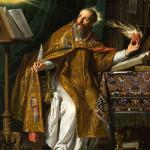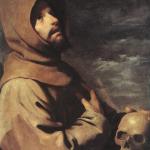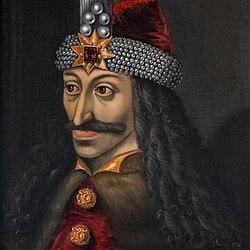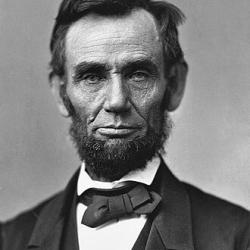Last Time on HOARATS
The Civil War Years in Wonderland- 1860 – 1869
As we enter into the 1870’s
Bl. Pius IX was Pope # 255
Ulysses S. Grant (1822–1885) was U.S. President # 19
from March 4, 1869 – March 4, 1877
1870
Picture This
Ford Madox Brown – Romeo and Juliet
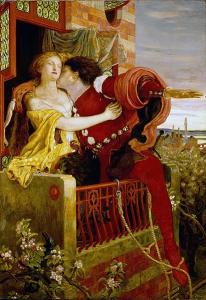
News of the World
Following the death of her husband Patrick, Catherine McCarty (Billy the Kid’s mom) and her sons moved to Indianapolis, Indiana, where she met William Henry Harrison Antrim. The McCarty family moved with Antrim to Wichita, Kansas, in 1870.
- January 3– Construction of the Brooklyn Bridge begins in New York City.
- January 10– John D. Rockefeller incorporates Standard Oil.
- January 15– A political cartoon for the first time symbolizes the United States Democratic Party with a donkey (A Live Jackass Kicking a Dead Lion by Thomas Nast for Harper’s Weekly).
- January 26– Reconstruction Era (United States): Virginia rejoins the Union. This year it adopts a new Constitution, drawn up by John Curtiss Underwood, expanding suffrage to all male citizens over 21, including freedmen.
- February 3– The 15th Amendment to the United States Constitution, guaranteeing African American men the right to vote, is passed.
- February 9– The U.S. Army Weather Bureau is created within the Army Signal Corps.
- February 10
- Anaheim, California, is incorporated.
- The YWCAis founded in New York City.
- February 12– Women’s suffrage: Women gain the right to vote in Utah Territory.
- February 23– Military control of Mississippi ends and it is readmitted to the Union.
- February 25– Hiram Rhodes Revels, a Republican from Mississippi, is sworn into the United States Senate, becoming the first African American to sit in the S. Congress.
- February 27– The ‘circle of the sun’ flag of Japan is adopted as the national flag for Japanese merchant ships, by proclamation of the Daijō-kan.
- March 24–Syracuse Universityis established in New York (state) and officially opens.
- A Chilean prospecting party led by José Díaz Gana discovers the silver ores of Caracolesin the Bolivian portion of Atacama Desert,[2] leading to the last of Chilean silver rushes and a diplomatic dispute over its taxation between Chile and Bolivia.[4][5]
- March 30-The 15th Amendment to the United States Constitution, giving African American men the right to vote, is ratified.
- Reconstruction: Texasis readmitted to the Union.
- March 31– Thomas Mundy Peterson is the first African American to vote in an election.
- June 8– The final splice on the first telegraph submarine cable between Great Britain and India is made.
- June 28– American President Ulysses S. Grant signs an act making the United States Independence Day, Thanksgiving Day, Christmas Day and New Year’s Day federal holidays in the United States.
- July 15–Reconstruction Era: Georgiabecomes the last former Confederate state of America to be readmitted to the Union.
- November 1– In the United States, the newly created Weather Bureau (later renamed the National Weather Service) makes its first official meteorological forecast: “High winds at Chicago and Milwaukee… and along the Lakes”.
Mysterious World
- 1870 Curses! – Colonel Jonathan Buck (February 20, 1719 – March 18, 1795) was a justice of the peace and is the subject of a legend that holds that he ordered a witch put to death by burning, and this witch put a curse on his tomb. There is a monument to Col. Buck erected in the Bucksport Cemetery in 1870 which bears a stain roughly in the shape of a woman’s lower leg. According to the legend, the stain is the leg and foot of the witch, and that the mark has reappeared whenever the tombstone has been replaced.
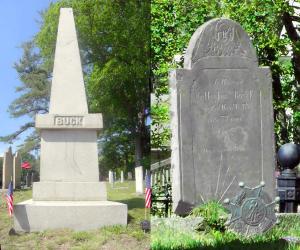
Arrivals
- William G. Morgan, (January 23, 1870 – December 27, 1942) was the inventor of volleyball, originally called “Mintonette”, a name derived from the game of badminton which he later agreed to change to better reflect the nature of the sport.
- Vladimir Lenin (April 10, 1870 – January 21, 1924)
- Emma Wilson (May 12, 1870 – October 13, 1983)
- Albert Fish, (May 19, 1870 – January 16, 1936) was an American serial killer, rapist, child molester and cannibal who committed at least three child murders between July 1924 and June 1928. He was also known as the Gray Man, the Werewolf of Wysteria, the Brooklyn Vampire, the Moon Maniac, and the Boogey Man. Fish was a suspect in at least ten murders during his lifetime, although he only confessed to three murders that police were able to trace to a known homicide. He also confessed to stabbing at least two other people.
- Mathew Beard, (July 9, 1870 – February 16, 1985: 114 years, 222 days), he was believed to have been the oldest living person in the world from the death of Emma Wilson till his own death.
- Blessed Solanus Casey (Francis) (November 25, 1870 – July 31, 1957).
- Saki (Hector Hugh Munro), (December 13, 1870 – November 14, 1916),English short story writer and dramatist who was killed in action in 1916 during a battle of WW 1.
Departures
- Charles Dickens (February 7, 1812 – June 9, 1870) creator of Oliver Twist, A Christmas Carol, A Tale of Two Cities and many other classic works of fiction dies at Gads Hill Place in Kent, leaving his last book, The Mystery of Edwin Drood, unfinished.
- Alexandre Dumas, père, (July 24, 1802 – December 5, 1870) creator of the Three Musketeers and The Count of Monte Christo.
- Robert E. Lee (January 19, 1807 – October 12, 1870) the famous Confederate Civil War general.
Publications Hot of the Press
- Jules Verne
- Twenty Thousand Leagues Under the Sea (Vingt mille lieues sous les mers)
- Around the Moon (Autour de la Lune)
- Charles Dickens – The Mystery of Edwin Drood
- Edward Lear – Nonsense Songs, Stories, Botany, and Alphabets (dated 1871),[11] including “The Owl and the Pussycat“
- J. E. Austen-Leigh – A Memoir of Jane Austen
- George MacDonald -At the Back of the North Wind (1870)
Good Sports
- April 29, 1870– The Chicago Base Ball Club, later to be known as the Chicago White Stockings and ultimately the Chicago Cubs, play their first game against the St. Louis Unions of the National Association of Base Ball Players, an amateur league.
Sanctifying Time
- July 18 – Pastor aeternus: Pope Pius IX declares papal infallibility, in matters of faith and morals.
- October 20– The First Vatican Council adjourns.
The Sound of Music and Other Cultural Milestones
Pyotr Ilyich Tchaikovsky–Romeo and Juliet overture (first version)
June 26 – Richard Wagner‘s opera Die Walküre premieres
at the Königliches Hof- und National-Theater, Munich
1871
Picture This
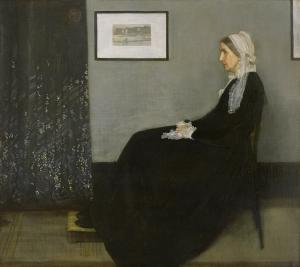
News of the World
- February 24, 1871: Representatives from Georgia, the final Confederate state to be readmitted, are seated in Congress.
- February 28, 1871: The Second Enforcement Act becomes law.
- March 3, 1871 – The first American civil service reform legislation is signed into law by U.S. President Ulysses S. Grant, creating the United States Civil Service Commission.
- April 20, 1871: The Ku Klux Klan Act becomes law.
- June 10, 1871 – United States expedition to Korea: Captain McLane Tilton leads 109 members of the United States Marine Corps in a punitive naval attack on the Han River forts on Ganghwa Island in Korea, resulting in 250 Koreans dying and diplomatic failure to “open up” Korea.
- June 27, 1871 – The Meiji government officially adopts the yen as Japan’s modern unit of currency. Coins which have been made in advance with the date 1870 are released into circulation.
- August 9, 1871 – One of the few known major hurricanes to strike Hawaii causes significant damage on the islands of Hawaii and Maui.
- September 2, 1871 – Whaling disaster of 1871: The Comet, a brig used by whalers, becomes the first of 33 ships to be crushed in the Arctic ice by an early freeze. Remarkably, all 1,219 people on the abandoned ships are rescued without a single loss of life.[
- November 5, 1871 – Wickenburg Massacre: Six men travelling by stagecoach, in the Arizona Territory, are reportedly murdered by Yavapai people.
- November 10, 1871 – Henry Morton Stanley, Welsh-born correspondent for the New York Herald, locates missing Scottish explorer and missionary Dr. David Livingstone in Ujiji, near Lake Tanganyika, and greets him by saying, “Dr. Livingstone, I presume?” (according to his later account).[
Arrivals
- Birdie Blye (March 24, 1871 – June 23, 1935) was an American pianist. At 5 year old she was “an infant prodigy” who was taught by the best teachers in the United States and Europe. At the age of 10, she gave concerts in London and other European cities. She was the only American who ever played at so early an age in orchestral concerts
- Stephen Crane (American) (November 1, 1871 – June 5, 1900) author of The Red Badge of Courage.
- Ernst Stromer von Reichenbach (June, 12, 1871 – December, 18, 1952) was a German paleontologist best remembered for his expedition to Egypt, during which the discovery of the first known remains of Spinosaurus and other extinct dinos were made.
Departures
- John Herschel (March 7, 1792 – May 11, 1871) was an English polymath active as a mathematician, astronomer, chemist, inventor and experimental photographer who invented the blueprint and did botanical work.
- Edward H. Rulloff – Wikipedia 1819/1820 – May 18, 1871) was a Canadian-born American medical doctor, lawyer, schoolmaster, photographer, inventor, carpet designer, phrenologist, and philologist, in addition to a career criminal and serial killer. This dichotomy was exemplified in the title of his 1871 biography, The Man of Two Lives!. He was also known as “The Genius Killer”. Rulloff’s brain is said to be the second largest brain on record, with a volume of 1673 cm3. It can be seen on display at the Wilder Brain Collection in the psychology department of Cornell University in Ithaca, New York.
- Edward C. Delavan (1793–1871) was a wealthy businessman who devoted much of his fortune to promoting the temperance movement. He helped establish the American Temperance Union; attacked the use of wine in Christian communion; established a temperance hotel in Albany, New York; traveled to Europe to promote teetotalism. He helped spearhead the local option movement in New York during the 1840s by which local majorities could vote their towns dry.
Publications Hot of the Press
- George MacDonald – The Princess and the Goblin (1871)
- Lewis Carroll – Through the Looking Glass and What Alice Found There (1871)
- Louisa May Alcott – Little Men (1871)
Good Sports
- March — ten NABBP clubs found the National Association of Professional Base Ball Players, the first professional sports league. (Today it is commonly considered the first major league and usually called simply the “National Association” or “NA”.) Thirty-three clubs establish a parallel amateur NAABBP that withers away.
- March 27 – The first Rugby Union International results in a 1–0 win, by Scotland over England.
- May 4 – The first supposedly Major League Baseball game is played in America.
- May 8 – The first Major League Baseball home run is hit by Ezra Sutton, of the Cleveland Forest Citys.
Sanctifying Time
- Saint Alphonsus Liguori proclaimed a Doctor of the Church
- Our Lady of Pontmain – Marian apparition at Pontmain, France
- Breakaway of the Old Catholics Sect
The Sound of Music and Other Cultural Milestones
“Onward, Christian Soldiers” is a 19th-century English hymn. The words were written by Sabine Baring-Gould in 1865, and the music was composed by Arthur Sullivan in 1871. Sullivan named the tune “St Gertrude,” after the wife of his friend Ernest Clay Ker Seymer, at whose country home he composed the tune.[1][2] The Salvation Army adopted the hymn as its favoured processional.[3] The piece became Sullivan’s most popular hymn.[1] The hymn’s theme is taken from references in the New Testament to the Christian being a soldier for Christ, for example II Timothy 2:3 (KJV): “Thou therefore endure hardness, as a good soldier of Jesus Christ.”
- April 10 – In Brooklyn, New York, P. T. Barnum opens his three-ring circus, hailing it as “The Greatest Show on Earth“.
1872
Picture This
1872 Snap the Whip – Wikipedia
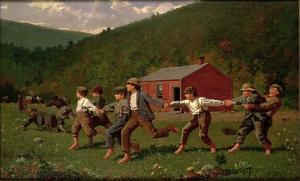
November 13 (07:35) (probable date) – Claude Monet begins painting Impression, Sunrise (Impression, soleil levant, the painting that will give a name to Impressionism) as viewed from his hotel room at Le Havre in France.
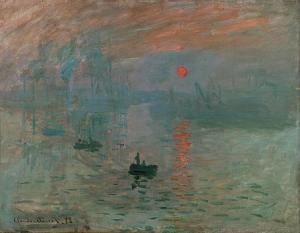
News of the World
- February 13, 1871 – Rex, the most famous parade on Mardi Gras, parades for the first time in New Orleans for Grand Duke Alexei Alexandrovich of Russia.
- February 17, 1871 – Filipino priests José Burgos, Mariano Gomez and Jacinto Zamora, collectively known as Gomburza, are executed in Bagumbayan Fields, Manila, Philippines by the authorities of New Spain, on charges of subversion arising from the 1872 Cavite mutiny.
- May – The magazine Popular Science is first published in the United States.
- May 10, 1871 – Victoria Woodhull becomes the first woman nominated for President of the United States, although she is a year too young to qualify and does not appear on the ballot.
- May 22, 1872: The Amnesty Act becomes law.
- September 26 – The first Shriners Temple (called Mecca) is established in New York City.
Mysterious World
1872 –Bohemian Grove: Conspiracy? The Bohemian Club is formed with Henry “Harry” Edwards, a stage actor as one of the founding members. The club meet in Bohemian Grove, Monte Rio, California, United States. It is a private San Francisco–based gentlemen’s club. The Bohemian Club’s all-male membership includes artists and musicians, as well as many prominent business leaders, government officials, former U.S. presidents, senior media executives, and people of power.
The Club motto is “Weaving Spiders Come Not Here,” which implies that outside concerns and business deals (networking) are to be left outside.

November 7, 1872 – The Mary Celeste sets sail from New York; bound for Genoa, Italy.
December 4, 1872 – The now-crewless American ship Mary Celeste is found (still seaworthy) by the British brig Dei Gratia in the Atlantic.
Arrivals
-
- Zane Grey (January 31, 1872 – October 23, 1939) was an American author and dentist. He is known for his popular adventure novels and stories associated with the Western genre in literature and the arts; he idealized the American frontier. Riders of the Purple Sage (1912) was his best-selling book.
- The Uganda Martyrs including Saint Kizito (1872 – June 3, 1886)
- Roald Amundsen (July 16, 1872 – c. June 18, 1928) was a Norwegian explorer of polar regions. He was a key figure of the period known as the Heroic Age of Antarctic Exploration.
- Maude Adams (November 11, 1872 – July 17, 1953), known professionally as Maude Adams, was an American actress and stage designer who achieved her greatest success as the character Peter Pan, first playing the role in the 1905 Broadway production of Peter Pan; or, The Boy Who Wouldn’t Grow Up. Adams’ personality appealed to a large audience and helped her become the most successful and highest-paid performer of her day, with a yearly income of more than $1 million during her peak.
Departures
- Samuel Morse (April 27, 1791 – April 2, 1872) was an American inventor and painter. After having established his reputation as a portrait painter, in his middle age Morse contributed to the invention of a single-wire telegraph system based on European telegraphs. He was a co-developer of Morse code in 1837 and helped to develop the commercial use of telegraphy.
- Harry Clifton (baptised May 20, 1832 – July 15, 1872) was an English music hall singer, songwriter and entertainer. A prolific composer in the popular genre, his most successful song was “Pretty Polly Perkins of Paddington Green” and Rocky Road to Dublin.
- William Wentworth, (August 1790 – March 20, 1872) was an Australian statesman, pastoralist, explorer, newspaper editor, lawyer, politician and author, who became one of the wealthiest and most powerful figures in colonial New South Wales. He was among the first colonists to articulate a nascent Australian identity.
Publications Hot of the Press
- Susan Coolidge – What Katy Did (first in the What Katy Did series of five books)
- December 22 – Jules Verne‘s novel Around the World in Eighty Days (since November 2) in the daily Le Temps, the day after the concluding date of the narrative.
- Ouida – A Dog of Flanders
- George MacDonald – The Princess and the Goblin
- Juliana Horatia Ewing – A Flat Iron for a Farthing
Good Sports
- November 30, 1871 — Scotland v. England in Glasgow is the first–ever official football international. The match is a goalless draw.
Sanctifying Time
- Quae in Patriarchatu – On the Church in Chaldae, by Pope Pius IX, 16 November 1872
- Saint Peter Faber is beautified.
- July 4 – The Society of Jesus is pronounced illegal in the German Empire.
The Sound of Music and Other Cultural Milestones
- The First performance in England of Bach‘s Brandenburg Concerto No 3 at a Philharmonic Society concert.
“The Gospel Train” by Fisk Jubilee Singers
1873
Picture This
Jan Matejko – Astronomer Copernicus, or Conversations with God
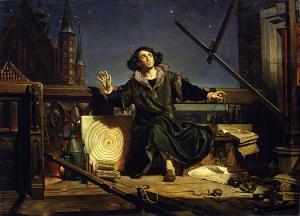
News of the World
- January 1,1873
- Japan adopts the Gregorian calendar.
- The California Penal Code goes into effect.
- February 12, 1873 – The Coinage Act of 1873 in the United States is signed into law by President Ulysses S. Grant; coming into effect on April 1, it ends bimetallism in the U.S., and places the country on the gold standard.
- March 4, 1873 – Ulysses S. Grant is sworn in for a second term as President of the United States.
- July 21, 1873 – At Adair, Iowa, Jesse James and the James–Younger Gang pull off the first successful train robbery in the American Old West (US$3,000 from the Rock Island Express).
- September 18, 1873 – A New York stock market crash helps to trigger the Panic of 1873, part of the Long Depression.
- November 18–21 , 1973– Irish Home Rule movement: The Home Government Association reconstitutes itself as the Home Rule League.
- December 23, 1873 – The Woman’s Christian Temperance Union is founded, in Hillsboro, Ohio.
Arrivals
- Dr. St. Thérèse of Lisieux OCD (January 2, 1873 – September 30, 1897)
- Adolph Zukor (January 7, 1873 – June 10, 1976) was a Hungarian-American film producer best known as one of the three founders of Paramount Pictures. He produced one of America’s first feature-length films, The Prisoner of Zenda, in 1913.
- Thomas Andrews, (February 7, 1873 – April 15, 1912) was a British businessman and shipbuilder, who was managing director and head of the drafting department of the shipbuilding company Harland and Wolff in Belfast, Ireland. He was the naval architect in charge of the plans for the ocean liner Titanic and perished along with more than 1,500 people when the ship sank on her maiden voyage.
- Melitta Bentz (January 31, 1873 – June 29, 1950), born Amalie Auguste Melitta Liebscher, was a German entrepreneur who invented the paper coffee filter in 1908. She founded the company Melitta, which still operates under family control.
Departures
- Mary Ann Cotton, (October 31, 1832 – March 24, 1873) was an English convicted murderer who was executed for poisoning her stepson. Despite her sole conviction for murder, she is believed to have been a serial killer who killed many others including 11 of her 13 children and three of her four husbands for their life insurance policies. Her preferred method of killing was poisoning with arsenic.
- March 19 – David Livingstone, (March 19, 1813 – May 1, 1873) was a Scottish physician, Congregationalist, pioneer Christian missionary with the London Missionary Society, and an explorer in Africa. Scottish missionary explorer.
- Sir Robert McClure (January 28, 1807 – October 17, 1873) was an Irish explorer who explored the Arctic. In 1854 he traversed the Northwest Passage by boat and sledge, and was the first to circumnavigate the Americas.
Publications Hot of the Press
- January 1 – In the United States, Chicago Public Library opens in an old water tank in the aftermath of the Great Chicago Fire of 1871.
- March 3 – The United States Congress enacts the Comstock Law, making it illegal to send any “obscene, lewd, or lascivious” books through the mail.
- Mark Twain (with Charles Warner) – The Gilded Age: A Tale of Today
- Jules Verne – Around the World in Eighty Days (book publication and first English translation) and In Search of the Castaways .
Good Sports
- October 19, 1873 — representatives of Yale Bulldogs, Columbia Lions, Princeton Tigers and Rutgers Scarlet Knights meet at the Fifth Avenue Hotel in New York City to codify the first set of intercollegiate football rules.
Sanctifying Time
- Etsi Multa – On the Church in Italy, Germany, and Switzerland, by Pope Pius IX, 21 November 1873
- Quartus Supra – On the Church in Armenia, by Pope Pius IX, 6 January 1873
- The Society of Mary, which combines education with missionary work, officially recognized by Pope Pius IX
The Sound of Music and Other Cultural Milestones
“Home on the Range” w. Brewster M. Higley m. Daniel E. Kelley
“Home on the Range” Brewster M. Higley (November 30, 1823 – December 9, 1911) m. Daniel E. Kelley February 1843 – Iowa, 1905) was an otolaryngologist who became famous for writing “My Western Home”. w. In 1871, Higley moved from Indiana and acquired land in Smith County, Kansas under the Homestead Act, living in a small cabin near West Beaver Creek. Higley was inspired by his surroundings and wrote “My Western Home”, which was published in the Smith County Pioneer (KS) newspaper in 1873 or 1874 and republished March 21, 1874 in The Kirwin Chief. Higley’s cabin home is now listed on the National Register of Historic Places as the Home on the Range Cabin.
1874
Picture This
1874 – Sleep and His Half-Brother Death is a painting by John William Waterhouse.
The painting itself is a reference to the Greek gods Hypnos (sleep) and Thanatos (death) who, in the Greek mythology, were brothers. Despite their similar poses in the painting, the character in the foreground is bathed in light, while his brother is shrouded in darkness; the first therefore represents Sleep, the latter Death. The personification of Sleep clasps poppies, symbolic of narcosis and dreamlike-states.
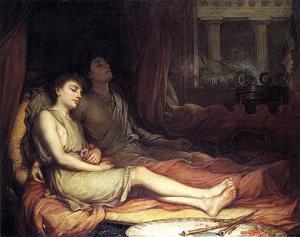
- April 15–May 15, 1874– A group of young painters, Société Anonyme Coopérative des Artistes, Peintres, Sculpteurs, Graveurs, gives their first exhibition, at the studio of the photographer Nadar in Paris. Louis Leroy‘s critical review of it published on 25 April gives rise to the term Impressionism for the movement, with reference to Claude Monet‘s Impression, Sunrise.
News of the World
- January 23, 1874 – Prince Alfred, Duke of Edinburgh, second son of Queen Victoria, marries Grand Duchess Maria Alexandrovna of Russia,[1] only daughter of Tsar Alexander III of Russia, in the Grand Church of the Winter Palace in Saint Petersburg.
- Kidnapping of Charley Ross (born May 4, 1870 – disappeared July 1, 1874) was the primary victim of the first American kidnapping for ransom to receive widespread media coverage. His fate remains unknown, and his case is one of the most famous disappearances in U.S. history.
- July 1, 1874
- The Universal Postal Union is established.
- The Philadelphia Zoo opens, the first public zoo in the United States.
- July 31, 1874 – Patrick Francis Healy, S.J., the first Black man to receive a PhD, is inaugurated as president of Georgetown University, the oldest Catholic University in America, and becomes the first Black person to head a predominantly White university.
- November 7, 1874 – Harper’s Weekly publishes a cartoon by Thomas Nast which is the first use of an elephant as a symbol for the Republican Party in the United States.
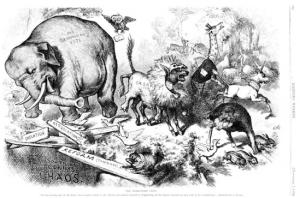
- November 9 , 1874– The New York Zoo hoax, a supposed breakout of animals from the Central Park Zoo, is perpetrated on the public.
- December 9, 1874 – Passage de Vénus is released as the oldest “film” in history.
Arrivals
- Thornton Waldo Burgess (1874 –1965) wrote approximately 172 books mostly involving animals
- Sir Ernest Shackleton, (February 15, 1874 – January 5, 1922) was an Anglo-Irish Antarctic explorer who led three British expeditions to the Antarctic. He was one of the principal figures of the period known as the Heroic Age of Antarctic Exploration.
- Robert Frost (March 26, 1874 – January 29, 1963) the famous poet.
- Lucy Maud Montgomery (November 30, 1874 – April 24, 1942) author of Anne of Greene Gables.
G.K. Chesterton (May 29, 1874 –June 14,1936) famous catholic writer and creator of the Father Brown mysteries. - Harry Houdini (March 24, 1874 – October 31, 1926) was a Hungarian-American escape artist, illusionist, and stunt performer, noted for his escape acts.
- Honus Wagner (February 24, 1874 – December 6, 1955), was an American baseball shortstop who played 21 seasons in Major League Baseball from 1897 to 1917, almost entirely for the Pittsburgh Pirates. Wagner won his eighth (and final) batting title in 1911, a National League record that remains unbroken to this day, and matched only once, in 1997, by Tony Gwynn.
Departures
- Henry H. Spalding (1803–1874) and his wife Eliza Hart Spalding (1807–1851) were prominent Presbyterian missionaries and educators working primarily with the Nez Perce in the U.S. Pacific Northwest. The Spaldings and their fellow missionaries were among the earliest Americans to travel across the western plains, through the Rocky Mountains and into the lands of the Pacific Northwest to their religious missions in what would become the states of Idaho and Washington. Their missionary party of five, including Marcus Whitman and his wife Narcissa and William H. Gray, joined with a group of fur traders to create the first wagon train along the Oregon Trail.
- Anna McClarmonde Chase (1809 – 1874) was an American merchant and spy for the United States during the Mexican–American War.
Publications Hot of the Press
- Donald Grant Mitchell retold part one of Gulliver’s Travels in the form of a short story for children, published in St. Nicholas magazine in 1874.
- Mark Twain moves into the house he has had built adjacent to that of Harriet Beecher Stowe in Hartford, Connecticut, where he will live until 1891 and work on his classic novels. The house today is a great tourist spot where tour guides dress up in character and lead you through the house. Next door is the Harriet Beecher Stowe house. She is the author of Uncle Tom’s Cabin.
Good Sports
- The Montreal Victorias hockey club, members of the Victoria Skating Club, begin play of ice hockey at the Victoria Skating Rink, leading to the first organized indoor game in 1875. The club does not formally exist until several years later, in 1877 or 1881.
- February 23, 1873 – Walter Clopton Wingfield patents in Britain a game called “sphairistike”, more commonly called lawn tennis.
Sanctifying Time
- Gravibus Ecclesiae – Proclaiming a Jubilee for 1875, by Pope Pius IX, 24 December 1874
- Omnem Sollicitudinem – On The Greek-Ruthenian Rite, Pope Pius IX, 13 May 1874
- Vix Dum a Nobis – On the Church in Austria, by Pope Pius IX, 7 March 1874
- Founding of the Servants of the Sacred Heart
- The Priestly Society of the Catholic Apostolate receives papal approval.
- March 25, 1874 – The Republic of Ecuador is consecrated to the Sacred Heart of Jesus, carried out by President Gabriel García Moreno and supported, blessed and specified by Pope Pius IX.
The Sound of Music and Other Cultural Milestones
1875
Picture This
1875 Archibald Willard
The Spirit of ’76 (aka Yankee Doodle)
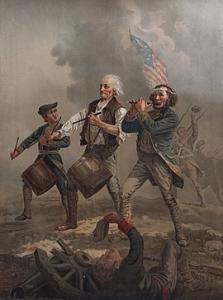
The Ballet Class (Degas, Musée d’Orsay) – Wikipedia 1875
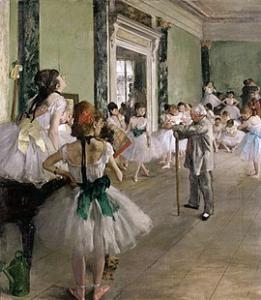
1875 Woman with a Parasol – Madame Monet and Her Son – Wikipedia
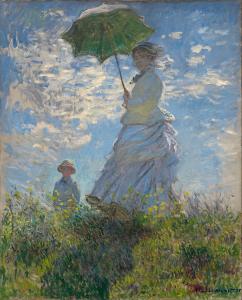
News of the World
- January 1, 1875 – The Midland Railway of England abolishes the Second Class passenger category, leaving First Class and Third Class. Other British railway companies follow Midland’s lead during the rest of the year (Third Class is renamed Second Class in 1956).
- March 1, 1875: The Civil Rights Act of 1875 becomes law.
- April, 1975 – ‘Albert’s swarm‘ of Rocky Mountain locusts begins to devastate the western United States.
- September 11 , 1875– Egypt adopts the Gregorian calendar, having previously used the Alexandrian calendar.
- December 9 , 1875– The Massachusetts Rifle Association, America’s oldest active gun club, is formed.
- December 20, 1875 – The ICRM is renamed the International Committee of the Red Cross (ICRC).
Arrivals
- Jeanne Calment, (February 21, 1875 – August 4, 1997) French supercentenarian, world’s longest lived person.
- Edgar Rice Burroughs (September 1, 1875 – March 19, 1950) creator of Tarzan and the John Carter of Mars series.
- Albert Schweitzer, (January 14, 1875 – 4 September 4, 1965) was an Alsatian polymath. He was a theologian, organist, musicologist, writer, humanitarian, philosopher, and physician. A Lutheran minister, Schweitzer challenged both the secular view of the historical Jesus as depicted by the historical-critical method current at this time, as well as the traditional Christian view. His contributions to the interpretation of Pauline Christianity concern the role of Paul‘s mysticism of “being in Christ” as primary and the doctrine of justification by faith as secondary.He received the 1952 Nobel Peace Prize for his philosophy of “Reverence for Life“, becoming the eighth Frenchman to be awarded that prize. His philosophy was expressed in many ways, but most famously in founding and sustaining the Hôpital Albert Schweitzer in Lambaréné, French Equatorial Africa (now Gabon). As a music scholar and organist, he studied the music of German composer Johann Sebastian Bach and influenced the Organ Reform Movement (Orgelbewegung).
Departures
- Hans Christian Anderson (April 2, 1805 –August 4,1875) author of many fairy tales including The Little Mermaid.
- Charles Kingsley (June 12, 1819 –January 23, 1875) author of The Water Babies.
- The brothers, Joseph Brooks (1802–1835), George (1805–1875) and Edward (1814–1893), founded their establishment at Otago Heads in 1831, the first enduring European settlement in what is now the City of Dunedin. The Weller brothers, Englishmen of Sydney, Australia, and Otago, New Zealand, were the founders of a whaling station on Otago Harbour and New Zealand’s most substantial merchant traders in the 1830s.
- Young Tom Morris (April 20, 1851 – December 25, 1875), was a Scottish professional golfer. He is considered one of the pioneers of professional golf, and was the first young prodigy in golf history. He won four consecutive titles in the Open Championship, and did this by the age of 21.
Publications Hot of the Press
- October 1 – American poet and short story writer Edgar Allan Poe is reburied in Westminster Hall and Burying Ground, Baltimore, Maryland, with a larger memorial marker. Controversy arises years later as to whether the correct body was exhumed.
- Louisa May Alcott – Eight Cousins
- George MacDonald – The Lost Princess (originally The Wise Woman)
- Mary Louisa Molesworth (Mrs. Molesworth) – Tell Me a Story
- Jules Verne – The Mysterious Island
Good Sports
- March 3, 1875 — first organised and recorded indoor game of ice hockey is played at the Victoria Skating Rink in Montreal.
- May 17, 1875 – Aristides wins the first Kentucky Derby.
- June 4, 1875 – Two American colleges play each other in arguably the first game of college football: Tufts University and Harvard University at Jarvis Field in Cambridge, Massachusetts.
- August 25, 1875 – Captain Matthew Webb becomes the first person to swim the English Channel.
Sanctifying Time
- James Augustine Healy becomes the first Black bishop in the U.S. (northtexascatholic.org)
- Graves ac Diuturnae – On the Church in Switzerland, by Pope Pius IX, 23 March 1875
- Quod Nunquam – On the Church in Prussia, by Pope Pius IX, 5 February 1875
- Episcopal approval of the Daughters of the Divine Will.
- Founding of the Congregation of the Cross.
- Miraculous cure at Lourdes of Pierre de Rudder.
- March 15 – Roman Catholic Archbishop of New York John McCloskey is named the first cardinal in the United States.
The Sound of Music and Other Cultural Milestones
“All the Way My Savior Leads Me” w. Fanny Crosby m. Robert Lowry
1876
Picture This
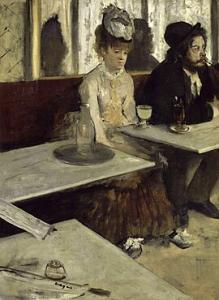
News of the World
- January 27, 1876 – The Northampton Bank robbery occurs.
- February 14, 1876– Alexander Graham Bell applies for a patent for the telephone, as does Elisha Gray.
- August 1, 1876 – Colorado is admitted as the 38th U.S. state.
- March 10 , 1876– Alexander Graham Bell makes the first successful telephone call, saying “Mr. Watson, come here, I want to see you”.
- May 18 , 1876– Wyatt Earp starts work in Dodge City, Kansas, serving under Marshal Larry Deger.
- June 25/26, 1876– American Indian Wars: Battle of the Little Bighorn: 300 men of the U.S. 7th Cavalry Regiment under Lieutenant Colonel George Armstrong Custer are wiped out by 5,000 Lakota, Cheyenne and Arapaho, led by Sitting Bull and Crazy Horse.
- November 6, 1876: The presidential election between Hayes and Tilden results in an electoral dispute over Florida, South Carolina, and Louisiana.
- December 6, 1876 – The first cremation in the United States takes place, in a crematory built by Francis Julius LeMoyne at North Franklin Township, Pennsylvania.
Arrivals
- Jack London January 12, 1876 – November 22, 1916) author of The Call of the Wild.
- Bess Houdini, January 23, 1876 – February 11, 1943) was an American stage assistant and wife of Harry Houdini.
- Edgar Evans (March 7, 1876 – February 17, 1912) was a Welsh Royal Navy petty officer and member of the “Polar Party” in Robert Falcon Scott‘s ill-fated Terra Nova Expedition to the South Pole in 1911–1912. This group of five men, personally selected for the final expedition push, attained the Pole on 17 January 1912. The party perished as they attempted to return to the base camp.
Departures
- George Armstrong Custer, (December 5, 1839 – June 25, 1876)American cavalry officer
- Wild Bill Hickock (May 27, 1837 – August 2, 1876), better known as “Wild Bill” Hickok, was a folk hero of the American Old West known for his life on the frontier as a soldier, scout, lawman, cattle rustler, gunslinger, gambler, showman, and actor, and for his involvement in many famous gunfights. He earned a great deal of notoriety in his own time, much of it bolstered by the many outlandish and often fabricated tales he told about himself. Some contemporaneous reports of his exploits are known to be fictitious, but they remain the basis of much of his fame and reputation.
- Saint Catherine Labouré, D.C. (May 2, 1806 – December 31, 1876)
Publications Hot of the Press
- Fyodor Dostoevsky – A Gentle Creature
- Jules Verne – Michael Strogoff
- Louisa May Alcott – Rose in Bloom
- Mark Twain – The Adventures of Tom Sawyer
- Lewis Carroll – The Hunting of the Snark
- March, 1876
- American librarian Melvil Dewey first publishes the Dewey Decimal Classification system.
- October 6 , 1876– The American Library Association is founded in Philadelphia.
Good Sports
- Walter Camp known as the “Father of American Football” enrolls at Yale University and will become perhaps the most important figure in college football history.
Sanctifying Time
The Sound of Music and Other Cultural Milestones
Peer Gynt, Op. 23, is the incidental music to Henrik Ibsen‘s 1867 play Peer Gynt, written by the Norwegian composer Edvard Grieg in 1875. It premiered along with the play on 24 February 1876 in Christiania (now Oslo)
1877
Picture This
Robert Bateman – The Pool of Bethesda
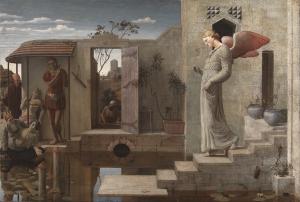
News of the World
- January 1 , 1877– Queen Victoria is proclaimed Empress of India by the Royal Titles Act 1876, introduced by Benjamin Disraeli, the Prime Minister of the United Kingdom .
- May 5, 1877 – Great Sioux War of 1876: Sitting Bull leads his band of Lakota into Canada, to avoid harassment by the U.S. Army under Colonel Nelson Miles.
- June 15, 1877 – Henry Ossian Flipper becomes the first African American cadet to graduate from the U.S. Military Academy.
- June 20, 1877– Alexander Graham Bell installs the world’s first commercial telephone service in Hamilton, Ontario, Canada.
- June 21, 1877 – The Molly Maguires are hanged at Carbon County Prison, in Mauch Chunk, Pennsylvania.
- July 16, 1877– Great Railroad Strike of 1877: Riots by Baltimore and Ohio Railroad railroad workers in Baltimore lead to a sympathy strike and rioting in Pittsburgh, and a full-scale worker’s rebellion in St. Louis, briefly establishing a Communist government, before U.S. President Rutherford B. Hayes calls in the armed forces.
- September 5, 1877 – American Indian Wars: Oglala Sioux chief Crazy Horse is bayoneted by a United States soldier, after resisting confinement in a guardhouse at Fort Robinson in Nebraska.
- November 21, 1877 – Thomas Edison announces his invention of the phonograph, a machine that can record sound, considered his first great invention. Edison demonstrates the device for the first time on November 29.
Rutherford B. Hayes (1822–1893) was President # March 4, 1877 – March 4, 1881
Mysterious World
1877 –The Pyramids of Egypt The Great Pyramid of Egypt, Miracle in Stone: Secrets and Advanced Knowledge (1877) is published by Joseph Augustus Seiss (March 18, 1823 – June 20, 1904). He was an American theologian and Lutheran minister known for his religious writings on pyramidology and dispensationalism. His book on the pyramid is considered a primary text of pyramidology.
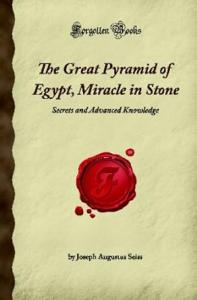
Arrivals
- George Hackenschmidt (August 1, 1878– February 19, 1968) was an Estonian strongman, professional wrestler, writer, and sports philosopher who is recognized as professional wrestling’s first world heavyweight champion.
- Lloyd C. Douglas, (August 27, 1877 – February 13, 1951) was an American minister and author. Douglas was one of the most popular American authors of his time, although he did not write his first novel until he was 50. His works include The Robe, The Big Fisherman, Magnificent Obsession.
- Charles Rolls, (August 27, 1877 – July 12, 1910) was a British motoring and aviation pioneer. With Henry Royce, he co-founded the Rolls-Royce car manufacturing firm. He was the first Briton to be killed in an aeronautical accident with a powered aircraft, when the tail of his Wright Flyer broke off during a flying display in Bournemouth. He was aged 32.
Departures
- Marie-Azélie “Zélie” Guérin Martin (December 23, 1831 –August 28, 1877) St. Therese’s mother.
- Servant of God Caroline Chisholm (May 30, 1808 – 25 March 25, 1877) was an English humanitarian known mostly for her support of immigrant female and family welfare in Australia.
- Brigham Young, June 1, 1801 – August 29, 1877) was an American religious leader and politician. He was the second president of the Church of Jesus Christ of Latter-day Saints (LDS Church) from 1847 until his death in 1877. During his time as church president, Young led his followers, the Mormon pioneers, west from Nauvoo, Illinois, to the Salt Lake Valley. He founded Salt Lake City and served as the first governor of the Utah Territory. Young also worked to establish the learning institutions that would later become the University of Utah and Brigham Young University. A polygamist, Young had at least 56 wives and 57 children. He formalized the prohibition of black men attaining priesthood, and led the church in the Utah War against the United States.
Publications Hot of the Press
- February 24–March 17 – Robert Louis Stevenson‘s first published work of fiction, the novella “An Old Song”, appears anonymously in four episodes in the magazine London. It is first attributed to Stevenson in 1980.
- July – The ending of Leo Tolstoy‘s Anna Karenina is published in Russkiy vestnik.
- November 24 – Anna Sewell‘s novel Black Beauty, his grooms and companions: the autobiography of a horse “translated from the equine” is published by Jarrolds of Norwich in England. Her only book, published five months before her death arising from long-standing illness, it rapidly establishes its position as an all-time bestseller, going on to sell fifty million copies[6] and becoming the sixth best seller in the English language.
- Louisa May Alcott – Under the Lilacs
- Mary Louisa Molesworth (Mrs. Molesworth) – The Cuckoo Clock
- Amy Catherine Walton (Mrs. O. F. Walton) – A Peep Behind the Scenes
Good Sports
- Star pitcher Jim Devlin and three other Louisville Grays are permanently expelled from the National League for arranging with gamblers to lose games. (Louisville finishes seven games behind Boston.)
- March 24, 1877 – For the only time in history, The Boat Race between the Universities of Oxford and Cambridge is declared a “dead heat” (i.e., a draw).
Sanctifying Time
- Saint Francis de Sales declared a Doctor of the Church
The Sound of Music and Other Cultural Milestones
The Sorcerer, Gilbert & Sullivan London production opened at the Opera Comique on November 17 and ran for 175 performances
“Chopsticks” m. Arthur de Lulli
April 10, 1877 – The first human cannonball act in the British Isles, and perhaps the world, is performed by 17-year-old Rossa Matilda Richter (“Zazel”) at the London Royal Aquarium.[
1878
New Pope
Pope # 256 Leo XIII (March 2, 1810 – July 20, 1903)
Papal Reign February 20, 1878 – July 20, 1903
(25 years, 150 days)
Picture This
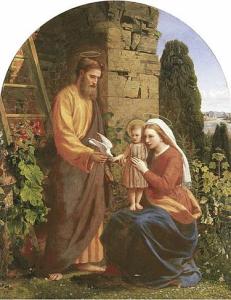
Fishing for Oysters at Cançale 1878, National Gallery of Art in Washington, DC
John Singer Sargent (January 12, 1856 – April 14, 1925)
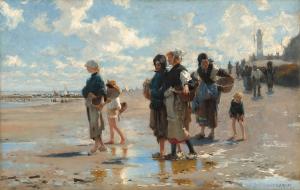
News of the World
- January 28, 1878 – The world’s First Telephone Exchange begins commercial operation in New Haven, Connecticut.
- February 19, 1878 – The phonograph is patented by Thomas Edison.
- July 26, 1878 – In California, the poet and American West outlaw calling himself “Black Bart” makes his last clean getaway when he steals a safe box from a Wells Fargo stagecoach. The empty box is found later with a taunting poem ins
- Albert Augustus Pope‘s Pope Manufacturing Company begins producing the Columbia high-wheel bicycle outside Boston, signalling the beginning of a bicycle craze in the U.S.
Mysterious World
May 1878 – The Salem witchcraft trial of 1878, also known as the Ipswich witchcraft trial and the second Salem witch trial, was an American civil case held in May 1878 in Salem, Massachusetts, in which Lucretia L. S. Brown, an adherent of the Christian Science religion, accused fellow Christian Scientist Daniel H. Spofford of attempting to harm her through his “mesmeric” mental powers. By 1918, it was considered the last witchcraft trial held in the United States. The case garnered significant attention for its startling claims and the fact that it took place in Salem, the scene of the 1692 Salem witch trials. The judge dismissed the case.
Arrivals
- John Masefield (June 1, 1878 – May, 12 1967) was an English poet and writer, and Poet Laureate from 1930 until his death in 1967. Among his best known works are the children’s novels The Midnight Folk and The Box of Delights, and the poems “The Everlasting Mercy” and “Sea-Fever“.
- St.Gemma Galgani (March 12,1878 – April 11, 1903: Aged 25) was an Italian mystic, venerated as a saint in the Catholic Church since 1940. She has been called the “daughter of the Passion” because of her profound imitation of the Passion of Christ. She is especially venerated in the Congregation of the Passion of Jesus (Passionists).
- Lionel Barrymore (April 28, 1878 – November 15, 1954) was an American actor of stage, screen and radio as well as a film director. He won an Academy Award for Best Actor for his performance in A Free Soul (1931) and is known to modern audiences for the role of villainous Mr Potter in Frank Capra‘s 1946 film It’s a Wonderful Life.
- Joseph Stalin,(December 6, 1878 – March 5, 1953) leader of the Soviet Union from 1924 until his death in 1953.
Departures
- Mariam Baouardy Saint Mary of Jesus Crucified (January 1846 – 26 August 1878) was a Discalced Carmelite nun of the Melkite Greek Catholic Church. Born to Palestinian Greek Catholic parents from the town of Hurfiesh in the upper Galilee, later moved to I’billin, she was known for her service to the poor. In addition, she became a Christian mystic who suffered the stigmata.
- Anna Sewell (March 30, 1820 –April 25, 1878) author of Black Beauty.
Publications Hot of the Press
- June – Robert Louis Stevenson‘s three linked detective fiction short stories The Suicide Club featuring Prince Florizel begin publication in The London Magazine.
- Leo Tolstoy – Anna Karenina (book publication)
- Randolph Caldecott – The House that Jack Built
- Jules Verne – Dick Sand, A Captain at Fifteen
- Robert Louis Stevenson – An Inland Voyage
Good Sports
Harry Buermeyer of the New York Athletic Club became the first official amateur heavyweight boxing champion in America, while recording the first knockout at Madison Square Garden by beating George Lee of the Union Athletic Club of Boston.
Sanctifying Time
- Miraculous cure at Lourdes of Joachime Dehant.
- February 7, 1877 – Pope Pius IX dies, after a 31½ year pontificate (the longest definitely confirmed).
- February 20, 1878 – Pope Leo XIII succeeds Pope Pius IX, as the 256th pope.
The Sound of Music and Other Cultural Milestones
Gilbert and Sullivan – H.M.S. Pinafore, London production (1878) 571 performances
“Aloha ʻOe” w.m. Queen Liliuokalani of Hawaii
- December 30 – Henry Irving‘s production of Hamlet, with himself in the title rôle playing opposite Ellen Terry as Ophelia, opens at the Lyceum Theatre, London (of which they have taken over the management)
1879
Picture This
Édouard Manet The Café-Concert
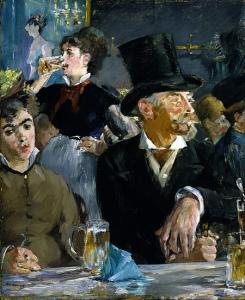
News of the World
- 1879 – Christian Science is founded in New England by Mary Baker Eddy, who wrote the 1875 book Science and Health with Key to the Scriptures, which outlined the theology of Christian Science.
- May 30, 1879 – New York City‘s Gilmore’s Garden is renamed Madison Square Garden after President James Madison by William Henry Vanderbilt, and is opened to the public at 26th Street and Madison Avenue.
- July 1, 1879 – Christian Restorationist Charles Taze Russell publishes the first issue of the monthly Zion’s Watch Tower and Herald of Christ’s Presence which, as The Watchtower, will become the most widely circulated magazine in the world.
- July 19, 1879 – Doc Holliday kills for the first time after a man shoots up Holliday’s New Mexico saloon.
- December 31, 1879 –Thomas Edison demonstrates incandescent lighting to the public for the first time, in Menlo Park, New Jersey.
Mysterious World
1879 –Mind-Control Parasites Heinrich Anton de Bary defines Symbiosis as “the living together of unlike organisms”.
Arrivals
- Servant of God Karol Wojtyła (July 18, 1879 – February 18,1941)
- Albert Einstein ; (March 14, 1879 – April 18, 1955) was a German-born theoretical physicist who is widely held as one of the most influential scientists. Best known for developing the theory of relativity, Einstein also made important contributions to quantum mechanics. His mass–energy equivalence formula E = mc2, which arises from relativity theory, has been called “the world’s most famous equation”. He received the 1921 Nobel Prize in Physics “for his services to theoretical physics, and especially for his discovery of the law of the photoelectric effect“, a pivotal step in the development of quantum theory. His intellectual achievements and originality have made the word Einstein broadly synonymous with genius.
- Kartini, (April 21, 1879 – September 17, 1904), was a prominent Indonesian activist who advocated for women’s rights and female education.Indonesian national heroine, women’s rights activist (d. 1904)
Departures
- St. Bernadette Soubirous (January 7, 1844 –April 16, 1879)
- Saint Jeanne Jugan (October 25, 1792 – August 29, 1879)
- James Clerk Maxwell (June 13, 1831 – November 5, 1879) was a Scottish physicist with broad interests who was responsible for the classical theory of electromagnetic radiation, which was the first theory to describe electricity, magnetism and light as different manifestations of the same phenomenon. Maxwell’s equations for electromagnetism have been called the “second great unification in physics“[3] where the first one had been realised by Isaac Newton.
Publications Hot of the Press
- January 11 – During construction of an extension to Birmingham Central Library in England, a fire destroys 50,000 books and the original manuscript of the Coventry Mystery Plays (including the “Coventry Carol“).
- George MacDonald – Sir Gibbie
- Louisa May Alcott – Jack and Jill: A Village Story
- E. W. Cole – Cole’s Funny Picture Book
- Henrik Ibsen – A Doll’s House
Good Sports
- The Irish Hurling Union formalises the sport for the first time.
Sanctifying Time
- August 21, 1879 – Our Lady of Knock – A group of 15 men, women, and children, ranging in age from 5 to 75, reported seeing an apparition behind their church, against the back wall, of an altar with a lamb on it (understood to represent Jesus), surrounded by a multitude of angels. Off to the side in prayer stood Mary, Joseph, and St. John (with St. John dressed as a bishop). Because Mary was among those seen, the apparition is classified as Marian, although the simultaneous appearance of Jesus, Mary, Joseph, John, and numerous angels makes it unique among this category. A further distinctive characteristic is that this apparition was silent: no verbal messages were given. The apparition lasted for an hour and a half.
- May 12, 1879 – English Catholic convert John Henry Newman is elevated to Cardinal.
The Sound of Music and Other Cultural Milestones
December 31 – Gilbert and Sullivan‘s comic opera The Pirates of Penzance opens at the Fifth Avenue Theatre in New York City (following a token performance the day before for U.K. copyright reasons in Paignton, Devon) It runs for 363 performances.
December 21 – The first production of Henrik Ibsen‘s controversial “modern drama” A Doll’s House takes place at the Royal Danish Theatre in Copenhagen, after publication there on December 4
Next Time on
1st Electric Circus Garden Outlaws – 1880 – 1888
HOARATS
To Understand
What I love and How I Write About History
Hit the Link Above.
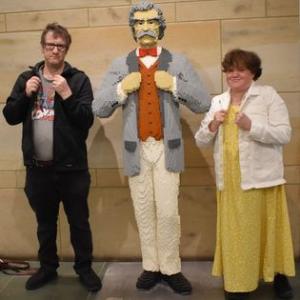
To understand about this particular series I’m writing about, please read
The Catholic Bard’s Guide To History Introduction
And to view a historical article click on


